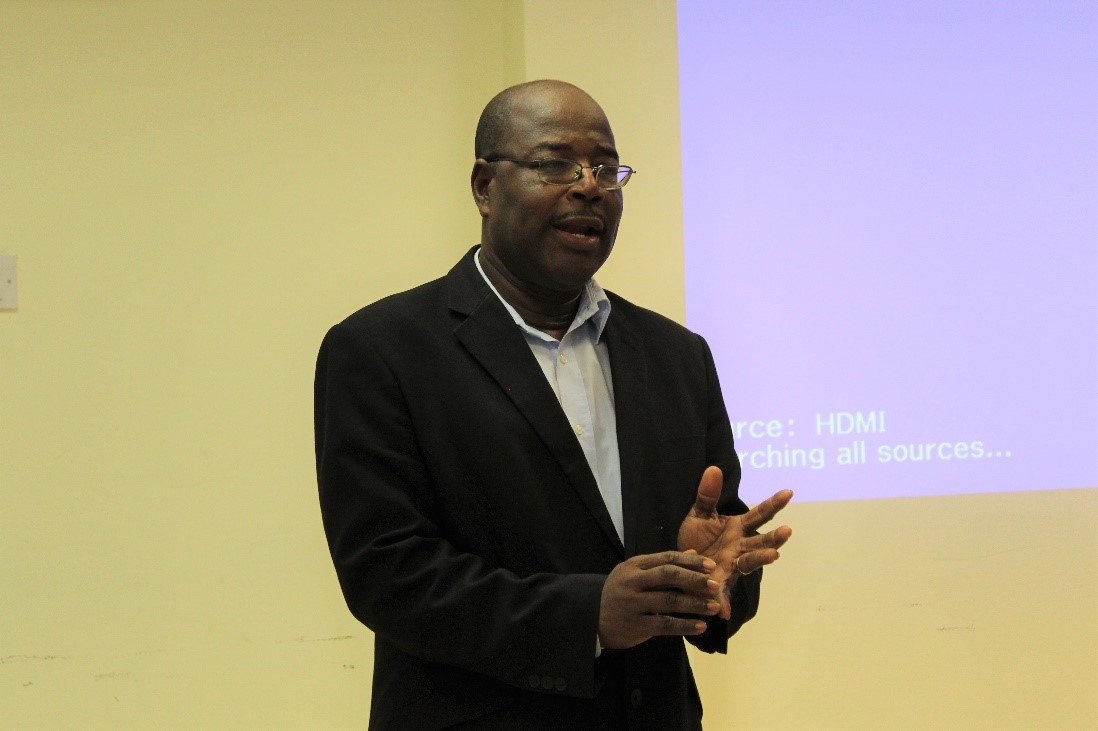




The School of Education and Leadership at the College of Education, University of Ghana has held a workshop to train faculty for the implementation of the 4-year Bachelor of Education programme. The Acting Dean of the School, and Programme Lead at the University of Ghana, Professor Jonathan Fletcher, in his opening address, updated participants about the master work plan of the programme and identified the activities that had been completed. He also introduced the newly Appointed Co-ordinator for the Bachelor of Education programme in the person of Dr. Kwame Butakor.

Professor Jonathan Fletcher delivering the opening address
Professor Sally Essuman, a member of the Bachelor of Education Curriculum Development team, took participants through how the Supported Teaching in Schools (STS) activity would be carried out. She explained that the Supported Teaching in Schools (STS) activity would be an enormous opportunity for student-teachers to learn within the different practical settings. This, according to her, would equip them with practical experience in the learning contexts and facilitate their output in the classroom setting. Professor Essuman drew a sharp comparison between STS and Teaching Practice which is currently being run in the various Colleges of Education and acclaimed the former as the more effective and better option.

Professor Sally Essuman
Ms. Dinah Adiko from the Gender and Inclusivity Team at “Transformimg Teacher Education and Learning” (T-TEL) educated participants about the extent to which gender, inclusivity and equity had been carefully engineered into the curriculum of the Bachelor of Education programme. She also highlighted the idea of fusing gender, inclusion and equity in the curriculum to make people sensitive to the individuals of the minority who had been marginalised. She emphasised that this would help educate and re-orient faculty and students on the various dynamics in the social settings that would promote gender and inclusion.

Ms. Dinah Adiko making a point during her presentation
Dr. Eric Ananga, a Senior Lecturer at the University of Education, Winneba and a member of the Bachelor in Education Curriculum Team, took participants through the model of progression in the B.Ed programme. Dr. Ananga introduced participants to the various specialisms and their distinctive features. These specialisms were Early Grade (KG-P3), Upper Primary (P4-P6) and JHS education programme. He also suggested that the University of Ghana, through the School of Education and Leadership, could assess its affiliate Colleges to help pull expertise from their various specialties to help build a strong Bachelor of Education Programme. He also admonished faculty members present to carefully think through how best to remodel the B.Ed programme to develop top-ups for those with Diploma in Education from the various Colleges of Education.

Dr. Eric Ananga
Dr. Paul Butakor, the Co-ordinator for the B.Ed programme and a senior lecturer at the Department of Teacher Education sensitised participants about the assessment processes of the programme. In his speech he emphasised that the B.Ed programme would be guided by the National Teacher Education Curriculum Framework (NTECF) and the the National Terchers’ Standards (NTS) which required a departure from exam-based summative assessment to more comprehensive formative assessments.

Dr. Paul Kwame Butakor
Prof. Regnald Ocansey, a member of the Curriculum Implementation Team and the Head of the Department of Physical Education and Sport Sport Studies, presented to the participants the new B.Ed Course Manual. In his remarks, Prof. Ocansey stressed that to meet NTECF’s weighting requirements, Physical Education and Music and Dance (PEMD) had been integrated into the new curriculum. Thus, a Subject Disciple (PEMD) is to ensure that ITE trainees benefited from a progressive content and pedagogical knowledge over the 4-year professional training. He also explained that harmonious delivery and development of effective teaching skills were needed to facilitate active play, dance and music which was one of the reasons why there was a need for such integration.

Prof. Regnald Ocansey
The new 4-year B.Ed programme is a Government and T-TEL initiative introduced as part of a comprehensive package of reforms within the teacher education sector. The 4-year curriculum constitutes the initial teacher education to be run in all public Colleges of Education in Ghana. As part of the reforms, each of the public Colleges of Education is now affiliated to one of five public Universities. The University of Ghana organised this workshop, for faculty mainly drawn from the School of Education and Leadership, as part of the preparations towards mentoring its six affiliate colleges.




Scenes from the workshop